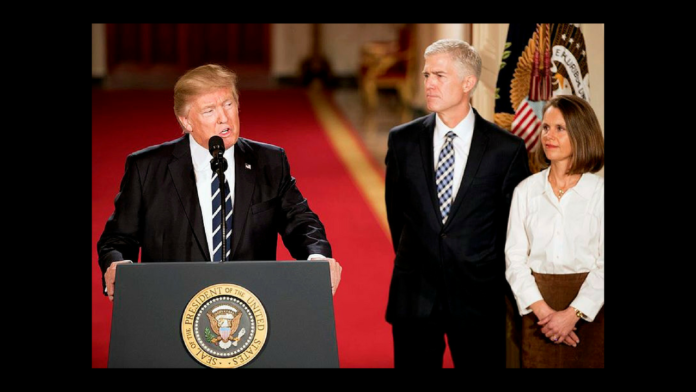WASHINGTON – The Senate confirmed Judge Neil Gorsuch on Friday ending more than a year of intense partisan fighting over the Supreme Court seat left vacant by the late Justice Antonin Scalia’s death.
Three Democrats crossed party lines on the final vote to confirm Gorsuch. Senate Republicans used a “nuclear option” rules change to allow a simple majority confirmation. Sens. Joe Manchin (D – WV), Heidi Heitkamp (D – ND), and Joe Donnelly (D – IN) voted to confirm Gorsuch. Trump carried all three of these states by large margins.
Sen. Johnny Isakson (R – GA) was absent from the vote.
Sens. Amy Klobuchar and Al Franken of Minnesota held with the majority of their Democratic colleagues in voting against Gorsuch.
Franken was more vocal than Klobuchar about his displeasure with Gorsuch’s nomination. An aggravated exchange took place between the two of them during the confirmation hearings, with Franken calling some of Gorsuch’s decisions “absurd.”
“I had a career in identifying absurdity,” Franken said, referring to his role on “Saturday Night Live”, “I know it when I see it, and it makes me question your judgement.”
Franken also stated on his Twitter account that, “Judge Gorsuch is not a consensus nominee like Merrick Garland and he should not be confirmed to U.S. Supreme Court.”
He followed through on his statement Friday by voting against Gorsuch. Klobuchar had been less harsh towards Gorsuch and less definitive in her statements, but still voted against him after expressing reservations throughout the confirmation process.
Klobuchar called Gorsuch’s nomination “a singular moment of constitutional and democratic unease” and accused him of practicing “selective originalism.”
Gorsuch’s confirmation was the tightest Supreme Court confirmation vote since Clarence Thomas was confirmed 52-48 in 1991. Prior to that, one would have to go back to the 1888 confirmation of Justice Lucius Lamar II to find a similar vote total, as President Grover Cleveland’s nominee squeaked by in a 32-28 vote.










